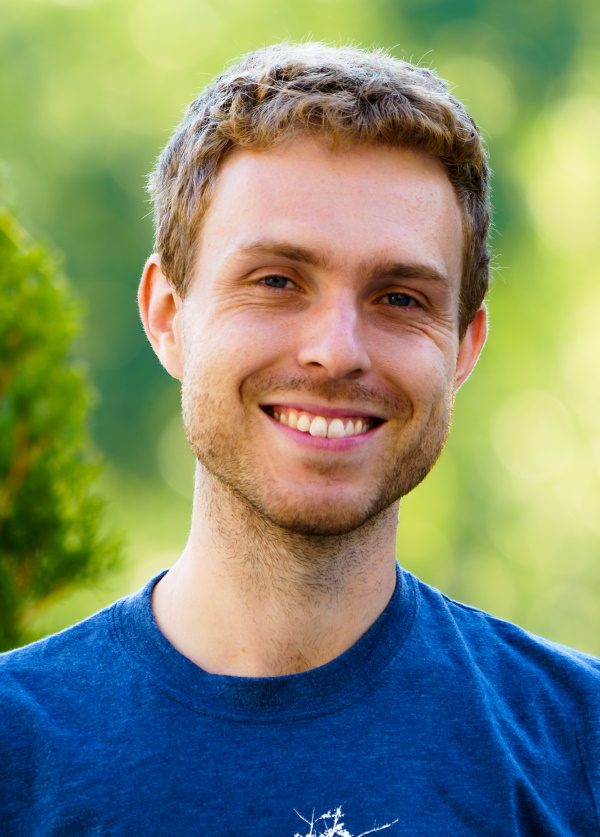Student Portraits
January 10, 2022
IVADO Student Portraits – Francis Banville
Our “IVADO Student Portraits” initiative consists of meeting students from our community to share their backgrounds, motivations and ambitions! We sat down with Francis Banville, PhD candidate in biology at Université de Montréal.

- Can you tell us a few words about yourself?
My interests are in ecology and mathematics, and I’m currently studying toward a PhD in biology at Université de Montréal. Safeguarding the quality of the environment is something especially close to my heart, as are issues of equity, diversity and inclusion in academia and beyond. I want to be part of science that is inclusive and diverse. This to me is fundamental to addressing the greatest challenge of our age: climate change. In my spare time, I’ve become an avid walker, an occasional jogger, and an amateur but committed ping-pong player!
- Tell us about your academic journey.
After spending nearly two years studying in the bachelor’s degree program in mathematics at Université de Montréal, I decided to switch to undergraduate studies in biology. I wanted to deepen my understanding of the environmental issues we face today. A little later, I eventually merged these two interests by completing a professional master’s in quantitative and computational biology. This enabled me to develop programming expertise and familiarize myself with the use of digital methods in ecology. These skills are now invaluable to me as a PhD student, where I’ve had my first real scientific research experience.
- What motivated you to choose digital intelligence?
Along my academic trajectory, I realized that ecology, as a science, could benefit from digital intelligence, among other things by making it easier for us to study complex ecological systems. I had done very little programming before my graduate studies, so at first I shuddered at the prospect of writing a few lines of code. Then I gradually got my hands dirty, and coding is now something I really enjoy. Another motivating factor for me to work in digital intelligence is the fact that there’s such a welcoming, open community of researchers.
- What are you working on for your research project?
Inter-species interactions dictate the functioning of ecosystems and determine how they respond to environmental changes. They are not well understood, however, because it can be difficult to observe all of the predation relationships in a given natural environment. So it’s essential to improve the scarcity of existing data through numerical predictions. My research focuses on development of statistical and mathematical models for predicting those predator-prey relationships in terrestrial environments, and for predicting the properties of the ecological networks formed by these trophic interactions.
- Any particular qualities that are serving you well for this project?
As graduate students, we often tend to neglect our mental and physical health. In my opinion, though, maintaining the right work-life balance is one of the most important keys to success in grad school. I think balancing research activities with private life, perseverance, and managing my time well are qualities that have been a huge help to me in my college and university studies. It can’t be overstated: it’s important to eat well, get enough sleep and get enough exercise, even when you’re writing a PhD thesis!
- What are your ambitions for the future?
We don’t know what biodiversity is going to look like in the future, because of changes in climate and land use. After my PhD, I’d very much like to do research on this ecological forecasting so as to improve it. To that end, I would seek to develop statistical models using a variety of digital intelligence tools. I could also contribute to implementation of an integrated biodiversity information system. Working as an environmental consultant and teaching at CEGEP or university are also attractive career options for me.
- Any resources to share?
There’s a YouTube channel from France, DirtyBiology, that’s one of my favourites. It regularly posts excellent science-communication clips on biology, always with a humorous touch. I also enjoy keeping up with the 3Blue1Brown and StatQuest channels, which, respectively, explain university-level concepts in mathematics and statistical methods, including machine learning and deep learning methods. Lastly, Richard McElreath’s book on Bayesian inference is an accessible textbook that was a bit help to me in learning statistics.
- Have you presented your research project in public? How did it go?
I wrote a science popularization article as part of the IVADO My research project in 800 words initiative. It was a really enriching experience because I had the support of a science communication advisor when I was writing it. The article led to me doing a great interview as part of the IVADO Digital October event during the Fall 2021 semester. A little later, I gave a presentation on my project at the 2021 Researchers’ Night, organized by Space for Life, as part of an exchange activity between scientists and the public.